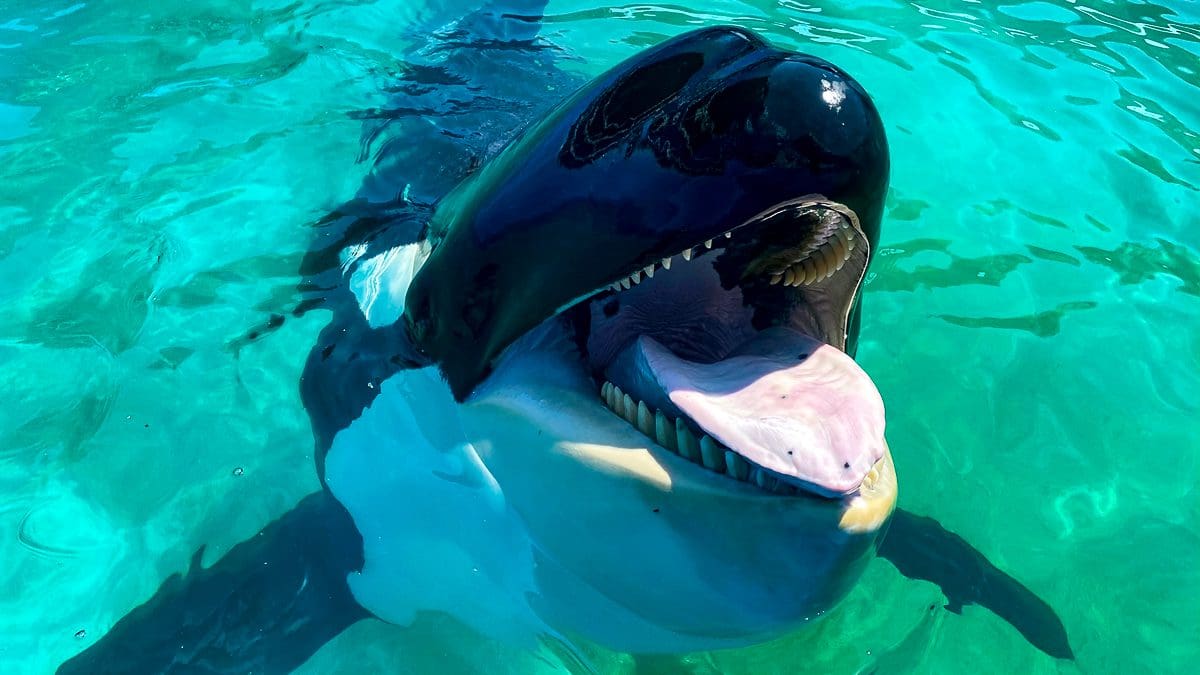It seems like a fairy tale, certainly a made-for-TV moment: Miami Seaquarium announcing last month that killer whale Lolita – its one-time top attraction also known as Tokitae – is to be moved to the waters of Puget Sound, where she was captured a half-century ago.
Now a new group, Truth 4 Toki, say efforts to transplant the 57-year-old orca to Pacific Ocean waters amount to a death sentence. Organizers say their group consists of about 30 former trainers, veterinarians and caretakers who cared for the orca over the years.
Truth 4 Toki has gathered more than 35,000 electronic signatures as of Thursday morning on a Keep Lolita in Florida petition The petition states if Lolita can’t remain at Seaquarium then she should be transported to the Shamu Stadium at SeaWorld Orlando, along with the two Pacific White-Sided dolphins – Lii and Loke – she has lived with for the last 30 years.
The group formed quickly when Seaquarium announced March 31 it had partnered with the owner of the Indianapolis Colts Jim Irsay and the philanthropic group Friends of Lolita to transport the orca to Puget Sound.
“All the people who have ever worked with Toki, or know anything about her, know that is just an absolutely horrible idea,” said Shanna Simpson, who was Lolita’s trainer from 2003 to 2009 and an organizer of Truth 4 Toki. She is now the animal curator at the Topeka Zoo in Kansas.
“We obviously want to stand up and speak for her because she can’t speak for herself.”
Friends of Lolita, Seaquarium and Irsay, however, don’t seem to be on the same page. Irsay tweeted on Saturday that Lolita will be placed in a sea pen and “if she is doing well will swim out to the ocean to see her 89-year-old mom and her pod.”
Eduardo Albor, the CEO of The Dolphin Co. and owner of Seaquarium, responded to Irsay’s tweet, saying there is not even a consideration in the plan to be submitted to federal authorities to allow Lolita to go in the open ocean because it would be too risky for her and the wild whales.
Pritam Singh, the developer who is a co-founder of Friends of Lolita, confirmed to the Key Biscayne Independent on Sunday that there are no plans for Lolita to eventually move out of a sea pen.

The Dolphin Company said it had no comment for this story and Isray’s representative did not return an email for request for comment.
Animal behaviorist Mark Simmons trained killer whales for SeaWorld and was involved in the only effort to return a killer whale to the wild. He said that no one is talking about whether the history of this particular zoological whale indicates she is a good candidate for reintroduction.
“Moving her to the Pacific Northwest after 50 years is just going to stress her out,” he said.
Truth 4 Toki points to the death of Keiko – the actual whale depicted in the “Free Willy” movies – who died of pneumonia in December 2003 off Norway after being fully reintroduced to the wild.
Keiko was never accepted by whale pods that live between Iceland and Norway, sought out human activity and had to be fed frozen fish throughout the seven-year project that cost more than $20 million, according to a study published by the Green Institute of Natural Resources.
Marine mammal scientist Charles Vinick, executive director at The Whale Sanctuary Project in Santa Barbara, Calif, mastermanded Keiko’s release into the wild. He is the co-founder of Friends of Lolita. He said Keiko’s release was not a total failure.
“What we learned from it was how easy it is to capture a whale and what we learned is how difficult it is to put one back,” Vinick said. “I do think that experience informs us about some of the aspects of what we would propose to do with Lolita in terms of providing her with a high quality of life in an enclosed netted habitat where she received 24/7 care.”
Lolita’s heartbreaking capture on Aug. 8, 1970 can be viewed on Youtube where her pod was disoriented by explosives, trapping her and eight adolescent whales in a cove. One mother trying to get to her calf along with four youngsters in the nets drowned.
In the early 1990s the late animal activist Russ Rector – a pioneer in the anti-captivity movement – unsuccessfully argued to the USDA that the 80-by-35-foot tank at Seaquarium violated federal requirements.
Then came the 2013 documentary “Blackfish” on the controversies – and deaths of trainers – involved in keeping orcas in captivity. The public sentiment shifted and SeaWorld in 2016 said it would phase out its whale shows and end its captive breeding program.
That still left Lolita, the oldest killer whale in captivity. The USDA in a 2021 report found issues with her enclosure and that she was fed rotted fish against her trainers’ wishes. The Dolphin Co. then bought the facility and agreed last year to cease having Lolita perform as her health failed.
“She does have a chronic infection that is treated with antibiotics but those are oral antibiotics and our veterinarians have reported she is stable, and they believe she is certainly healthy enough for transport to the Pacific Northwest,” Vinick said.
Simpson said that those who have been Lolita caretakers know the geriatric whale is not an animal that likes even modest changes to her Seaquarium environment.
To move a 5,000-pound whale across the country to a new enclosed habitat in wild waters will have to be approved by the USDA and the National Marine Fisheries Service, Vinick said. The transportation of Lolita could be up to two years away.
Simmons, who wrote the behavioral rehabilitation strategy for Keiko’s introduction, said even if transporting Lolita across the country is successful, she wouldn’t survive in the polluted waters of Puget Sound after surviving in the controlled environment of Seaquarium.
“She probably doesn’t survive past four to six weeks after transport,” he said.
Vinick said that he is more than willing to sit down with those who oppose moving Lolita, saying the issues being brought up by Truth 4 Toki are important to discuss.
“So I think we all have to consider these issues thoughtfully. I think we can all be talking about them together,” he said.
Invest in Local News for Your Town. Your Gift is tax-deductible
JOHN PACENTI is the executive editor of the Key Biscayne Independent. John has worked for The Associated Press, the Palm Beach Post, Daily Business Review, and WPTV-TV.



